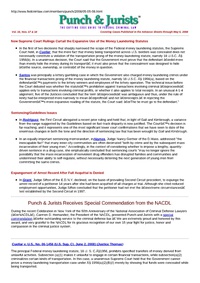Loaded on
May 1, 2008
published in Punch and Jurists
May 05, 2008
Re-sentencing for violation of conditions of a supervised release is affirmed where: 1) although the district court was not authorized under 18 U.S.C. § 3584(a) at the first sentencing hearing to direct defendant's federal sentence run consecutively to a not-yet-imposed state sentence; nevertheless 2) the district court did not …
Loaded on
May 1, 2008
published in Punch and Jurists
May 05, 2008
Here the Court declined to expunge the arrest record of a petitioner 14 years after she had been acquitted of all charges at trial on the grounds that she had failed to meet the "extreme circumstances" test established by prevailing precedent.
For reasons we have never really understood, …
Loaded on
May 1, 2008
published in Punch and Jurists
May 05, 2008
Starting in the mid-1990's, a number of prosecutor’s offices in districts that were strained by high immigration case workloads began to offer diminished charges or sentences in immigration cases in exchange for a defendant's agreement to waive certain procedural rights. These programs quickly became known as “fast-track” sentencing programs; …
Loaded on
May 1, 2008
published in Punch and Jurists
May 05, 2008
The defendant in this case, Myles Haynes, was one of 18 persons arrested during a drug sweep conducted jointly by the FBI and the Boston Police in a public housing development in Jamaica Plain, MA in May of 2006. As often happens, the defendants were charged and indicted separately. …
Loaded on
May 1, 2008
published in Punch and Jurists
May 05, 2008
Conviction and sentence to life of imprisonment for conspiracy to commit murder in connection with a narcotics offense is affirmed over claims regarding: 1) insufficiency of the indictment; 2) erroneous jury instructions; and 3) various sentencing errors.
[Editor's Note: For a further comment on this decision, see "4(b) and …
Loaded on
April 1, 2008
published in Punch and Jurists
May 05, 2008
Here a unanimous Court held that the mere fact that money being transported across U.S. borders was concealed does not necessarily constitute a violation of the transportation prong of the money-laundering statute, namely 18 U.S.C. § 1956(b).
The principal Federal money laundering statute, 18 U. S. C.§1956, prohibits …
Loaded on
April 1, 2008
published in Punch and Jurists
May 05, 2008
The principal Federal money laundering statute, 18 U. S. C. § 1956, prohibits specified transfers of money derived from various unlawful activities. Subsection (a)(1) makes it unlawful to engage in certain financial transactions using the “proceeds” of specified unlawful activities with the intent to promote those activities or to …
Loaded on
April 1, 2008
published in Punch and Jurists
May 05, 2008
Sentences for, inter alia, bank fraud, tax evasion, false statements, conspiracy, and mail fraud are vacated and remanded where the trial court's sentencing terms were substantively unreasonable and constituted an abuse of discretion in light of: 1) procedural errors; 2) clear factual errors; and 3) misinterpretations of 18 U.S.C. …
